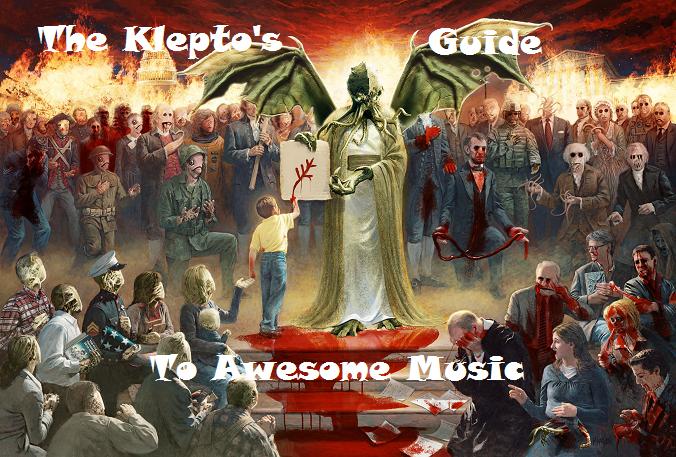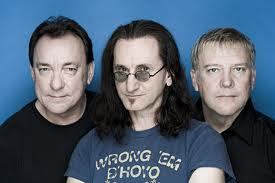 This one is going to be a long one, partially because "2112" itself clocks in at over twenty minutes, but also because there is so much to discuss...and I love this song. It is filled with everything I love about progressive rock songs; there is an underlying story (this one of science-fiction origin), there are large segments of amazing instrumentals, and many of the elements that are seen at the beginning of the song are brought up again within later segments. This song is one of my favorites of all time, and I can't even count how many times I have heard it over they years. Enough that I've had time to go over every nuance of it's composition and story - to the point that I can explain parts to my father, who has been listening to the song for a decade longer then I. Fucking amazing.
This one is going to be a long one, partially because "2112" itself clocks in at over twenty minutes, but also because there is so much to discuss...and I love this song. It is filled with everything I love about progressive rock songs; there is an underlying story (this one of science-fiction origin), there are large segments of amazing instrumentals, and many of the elements that are seen at the beginning of the song are brought up again within later segments. This song is one of my favorites of all time, and I can't even count how many times I have heard it over they years. Enough that I've had time to go over every nuance of it's composition and story - to the point that I can explain parts to my father, who has been listening to the song for a decade longer then I. Fucking amazing. While I grew up with Rush, the most of the epic "2112" was the little blurb they play on the radio, and on their Chronicles greatest-hits album, "2112 Overture/The Temples of Syrinx," which at almost seven minutes in length (very long for a radio track) still pales in comparison to the original version. My father, realizing that I was missing out on one of the best songs in rock history, tried to explain to me the awesomeness of the full track, but without my own way to judge, it did little for me. He fixed this dilemma at around my sixteenth birthday (I can't remember the actual year), purchasing for me the entire album 2112. Here I am, almost ten years later, still rocking out to a song that was released ten years before I was born, it is just that good.
While I grew up with Rush, the most of the epic "2112" was the little blurb they play on the radio, and on their Chronicles greatest-hits album, "2112 Overture/The Temples of Syrinx," which at almost seven minutes in length (very long for a radio track) still pales in comparison to the original version. My father, realizing that I was missing out on one of the best songs in rock history, tried to explain to me the awesomeness of the full track, but without my own way to judge, it did little for me. He fixed this dilemma at around my sixteenth birthday (I can't remember the actual year), purchasing for me the entire album 2112. Here I am, almost ten years later, still rocking out to a song that was released ten years before I was born, it is just that good. Rush - "2112" (Listen while you read)
So, 'the song,' you ask, 'what about the song?' Let me tell you the tale of the epic-masterpiece that is "2112." First, a little background, something you're not likely to get from the song. Well, the year is 2112 (duh) and the galaxy is under the control of the 'Red Star of the Solar Federation,' which is led by the Priests of the Temples of Syrinx. These priests control everything that is seen in the Solar Federation, every book, song, and video must first be approved by them. This leads to a very totalitarian society, and this is the setting of the song.
 |
| Alex Lifeson - Guitar |
The third part of the song, "Discovery," chimes in six minutes and forty-five seconds for approximately three-and-a-half minutes. It's during this part that the unnamed protagonist - hereafter named the Hero - is introduced. The Hero, somehow (it's not really explained) stumbles upon an ancient wonder, a guitar. He has never seen this device before and begins to experiment with the plucking and strumming of the strings, and much to his delight, sound emanates. With this instrument he learns that he can create music much different that what has been approved by the Priests of the Temples of Syrinx, something that he feels the people should be a part of. Excitedly, he rushes to the Temple to show the Priests what he has discovered.
This is where part four, "Presentation," kicks in; the Hero explains his wonder to the Priests and at first they abash him, telling him to forget his whimsical toy. Regardless, the Hero presses on, trying to convince them that they need to hear what the guitar can do. Getting upset, the Priests tell him that the average man has little need for distractions such as this, and that items like this guitar led to the destruction of the original society. This being said, they take and destroy the Hero's guitar, much to his dismay.
 |
| Geddy Lee - Bass & Vocals |
After the Hero awakes, he discovers that he can't go on living this way, under the gaze of the Priests and without the music of the guitar. He decides to take his own life (part six, "Soliloquy"), to try and join the Elder Race on their paradise planet.
As he dies (the final segment, "Grand Finale"), either in his mind or in the world he lives in (again, it's not made clear), the Elder Race returns to the Red Star of the Solar Federation and beings a war to reclaim their lands. The majority of this part is instrumental, with the music dieing out to the haunting repeating line of "Attention all planets of the Solar Federation: We have assumed control," supposedly a message from the Elder Race. Thus the song ends.
Wow, that was huge, and that's only to explain the song and story within, there is so much more to talk about. First, the progressive themes. In usual Rush form, the song jumps seemingly randomly across time signatures and styles, moving from instrumental metal jams, to gentile guitar and vocals. Then, periodically the music jumps from this simple, beautiful sound into a jamming rock n' roll section - often only for a few seconds. This is added for emphasis, when talking to the Priests of Syrinx, or when the scene changes, etc. And of course, as I mentioned earlier, there are themes that are reiterated at later parts within the song. The guitar and drum rhythm of "The Temples of Syrinx" returns close to the end of the song, within "Oracle: The Dream," to great emphasis and power! It's a really moving segment, even now I'm getting goose bumps thinking about it. It's the small flourishes like this, things that you may not understand on your first few listens, that add to the greatness of the track, and the legacy that is Rush!
 |
| Neil Peart - Drums & Percussion |
On top of Lee's amazing vocals, the entire band does a superb job on their own. The Guitar work of Alex Lifeson grows and ebbs with the story, and the guitar solos that take place - one after the Hero is cast out of the Temple, and again after he kills himself - are legendary. Geddy Lee's bass work, while not as prevalent as within songs like "La Villa Strangiato (An Exercise in Self-Indulgence)" or "YYZ," it is still ever present, adding to the depth of the full sound. And of course, Rush would be just another average classic-rock band without the God-on-the-skins, Neil Peart. Everything that man does is solid gold, from his ever-changing four-bar-phrases (most drummers stick with one or two phrases per song, Peart switched between half-a-dozen), to his over-the-top drum solos. He is also the main writer of Rush, giving the masterpiece "2112" the words for Lee to voice. This isn't a group, this is a single living organism, and it is godly!
Now that I'm done drooling over myself and the song, "2112" is as deep as any of those literary novels you had to read in high school/college and I think should be mandatory for everyone shooting for higher education. I got way more out of this work of art, then Mary Shelley's Frankenstein or anything by Poe (god I hate poetry). There is character development, a driven storyline, multiple characters, and the tale of good vs evil. Damn this one is genius!


No comments:
Post a Comment